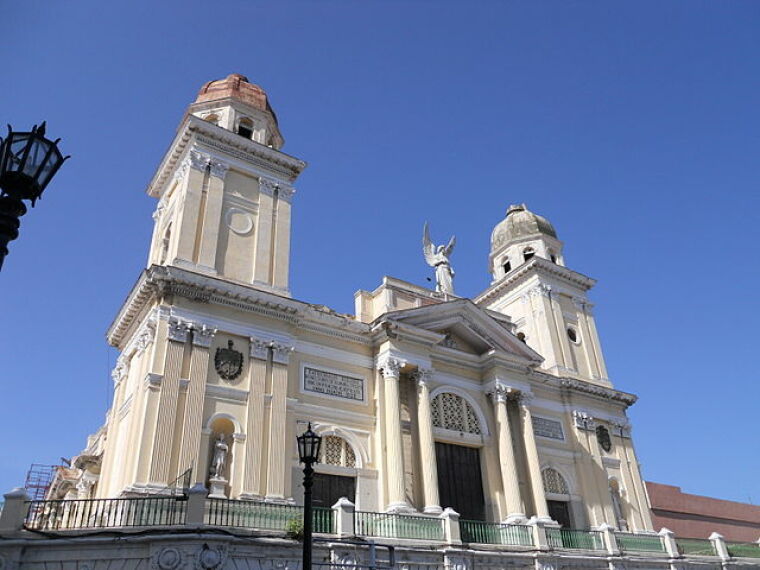Evangelical churches are thriving in Cuba following decades of restriction

Evangelical churches have seen an exponential growth in the past few years in Cuba, where religious freedom has been previously suppressed by the Communist government.
There are still restrictions against building new churches in Cuba, but it has not stopped the expansion of evangelical churches, with tens of thousands of Cubans worshipping across the island each week without government interference.
"There's a revival of these churches, of the most diverse denominations in the country, and all of them are growing, not just in the number of members, but in their capacity to lead and act in society," said Presbyterian pastor Joel Ortega Dopico. "There is religious freedom in Cuba," he added.
Dopico, the president of the officially recognized Council of Churches of Cuba, currently leads 32 Protestant denominations.
Cuba's softening stance on religion was due in part to Rev. Juan Francisco Naranjo, who was sent to two years of work camp in the 1960s for preaching the Gospel. He was one of the pastors who met with Fidel Castro to push for more religious freedom, and his church worked to build ties between religious groups and the Communist Party.
Naranjo died in 2000, but his church is now providing treatments for disabled children, and the Sunday service is packed and noisy.
According to clergy and academics, Cuba's population of 11 million include some 40,000 Methodists, 100,000 Baptists and 120,000 members of the Assemblies of God, which only had about 10,000 members during the early 1990s, when the government started easing restrictions on religious expression.
Religious freedom in Cuba is one of the key demands that will be made by U.S. President Donald Trump's administration after it finishes its review of former President Barack Obama's opening with the Communist country, according to The Associated Press.
Some outside groups have accused the communist regime of systematically repressing the growing ranks of evangelicals and other Protestants through seizures and demolitions of hundreds of churches across the island.
The Communist government now recognizes freedom of religion, but it still does not allow new churches or other religious structures to be built in the country. Members of churches that have been demolished in recent years continue to meet in makeshift home sanctuaries.
In 2016, the advocacy group Christian Solidarity Worldwide (CSW) accused the Cuban government of committing 2,380 violations of religious liberty. The group alleged that the government had declared as many as 2,000 Assemblies of God churches illegal, with 1,400 being in the process of confiscation.
However, Juan Whitaker, the Assemblies of God's treasurer in Cuba, told AP that none of its churches have been declared illegal or at risk of confiscation.
David Ellis, regional director for Latin America and the Caribbean for world missions of the Missouri-based General Council of the Assemblies of God, also clarified that none of its churches have been confiscated.
"We are in ongoing contact with the Cuba Assemblies of God leadership and they have not reported any churches being confiscated. Neither have they reported that churches have been threatened with confiscation," said Ellis.
Kiri Kankhwende, a spokeswoman for CSW, said that the advocacy group has not changed its assessment on Cuba and that statements to the contrary could be explained by official pressure on the churches.
 Christians don't have to affirm transgenderism, but they can’t express that view at work: tribunal
Christians don't have to affirm transgenderism, but they can’t express that view at work: tribunal Archaeology discovery: Medieval Christian prayer beads found on Holy Island
Archaeology discovery: Medieval Christian prayer beads found on Holy Island Presbyterian Church in America votes to leave National Association of Evangelicals
Presbyterian Church in America votes to leave National Association of Evangelicals Over 50 killed in 'vile and satanic' attack at Nigerian church on Pentecost Sunday
Over 50 killed in 'vile and satanic' attack at Nigerian church on Pentecost Sunday Ukrainian Orthodox Church severs ties with Moscow over Patriarch Kirill's support for Putin's war
Ukrainian Orthodox Church severs ties with Moscow over Patriarch Kirill's support for Putin's war Islamic State kills 20 Nigerian Christians as revenge for US airstrike
Islamic State kills 20 Nigerian Christians as revenge for US airstrike Man who served 33 years in prison for murder leads inmates to Christ
Man who served 33 years in prison for murder leads inmates to Christ


 Nigerian student beaten to death, body burned over ‘blasphemous’ WhatsApp message
Nigerian student beaten to death, body burned over ‘blasphemous’ WhatsApp message 'A new low': World reacts after Hong Kong arrests 90-year-old Cardinal Joseph Zen
'A new low': World reacts after Hong Kong arrests 90-year-old Cardinal Joseph Zen Iran sentences Christian man to 10 years in prison for hosting house church worship gathering
Iran sentences Christian man to 10 years in prison for hosting house church worship gathering French Guyana: Pastor shot dead, church set on fire after meeting delegation of Evangelicals
French Guyana: Pastor shot dead, church set on fire after meeting delegation of Evangelicals ‘Talking Jesus’ report finds only 6% of UK adults identify as practicing Christians
‘Talking Jesus’ report finds only 6% of UK adults identify as practicing Christians Mission Eurasia ministry center blown up in Ukraine, hundreds of Bibles destroyed: 'God will provide'
Mission Eurasia ministry center blown up in Ukraine, hundreds of Bibles destroyed: 'God will provide' Church holds service for first time after ISIS desecrated it 8 years ago
Church holds service for first time after ISIS desecrated it 8 years ago Burger King apologizes for 'offensive campaign' using Jesus' words at the Last Supper
Burger King apologizes for 'offensive campaign' using Jesus' words at the Last Supper Uganda: Muslims abduct teacher, burn him inside mosque for praying in Christ’s name
Uganda: Muslims abduct teacher, burn him inside mosque for praying in Christ’s name